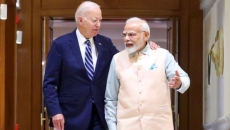United Nations, July 17 (IANS) Suman Bery, the Vice Chairman of NITI Aayog which is tasked with guiding policies for achieving Prime Minister Narendra Modi’s visions for India, has spoken exclusively with the IANS UN bureau in New York.
Shri. @suman_bery, VC, #NITIAayog, addressed a gathering of investors and leaders of industry on 'Developed India @ 2047' in an event organized by @IndiainNewYork in collaboration with @USISPForum.
— NITI Aayog (@NITIAayog) July 17, 2024
He highlighted India's impressive growth in various sectors, aimed at achieving… pic.twitter.com/WaKkqZWsXV
Following the release of the International Monetary Fund (IMF) report that reiterated India’s position as the world’s fastest-growing economy, Bery discussed strategies for growing the nation into a developed society by 2047, working with the private sector, the role of agriculture, development of states, and lessons for the Global South from India’s experience.
Bery combines the experience of working with the private sector, as the chief economist of Royal Dutch Shell, with think-tanks as a scholar, and with the World Bank as an economist.
Here are excerpts from the interview:
IANS: You just spoke at an international meeting, the high-level political forum on sustainable development where countries from around the world took up vital topics. What are the takeaways from the Indian model for other Global South countries?
Bery: India has its own challenges. And I think one reason for India's success is that it has mechanisms to come up with its own solutions. With Prime Minister Modi at the helm for 10 years and now having been selected for another five years, I think there are certain lessons to be drawn.
First, I would talk about the economic mandate. When the last Parliament was being dissolved, the government came out with a white paper that talked about the situation they inherited: India as a part of the so-called 'Fragile Five'. Now it is one of the fastest-growing economies in the world. A lot of that has to do with sheer economic management, making sure that the inflation rate is down, good administration, and the GST (Goods and Services Tax).
So, there are certain basics, which, I think, India's experience confirms are important.
But I do feel that [in] India's case, the emphasis even at the time of Covid and after it on infrastructure has been quite important... Important for employment and productivity, and also for connectivity.
And finally, the digital story is fairly well recognised. What India's digital success points out is actually the link between intelligent policy and a fairly dynamic private sector, a successful model of public-private partnership.
IANS: You mentioned the private sector. There has been a big change in India’s planning model, from the old commission to the NITI Ayaog where policies emphasise broader participation of the private sector with an important role in the nation's development. How do you see that working out, and the response?
Bery: I think there are two or three separate issues. One is that after the liberalisation of 1991, the private sector was meant to play a much larger role. [But] it took 30 years and the arrival of a new government to recognise the reality.
I would say that we have not made as much progress as we might have. In going from development being a question of government schemes to development being seen as a question of appropriate policies, I think what we have to do now is trust our policies more, and have more stable policies.
Having said that, I do want to come back to what I said about digital public infrastructure because what that points out is the importance of intelligent regulation. There are two dimensions to how the government and therefore the Niti Aayog interacts with the private sector.
One is through policies, and the other is through regulation. In both of these, I think India has made a promising start, but to become a developed economy by 2047, much more needs to happen.
IANS: How do you see the role of states in India’s development? How to level the disparities between states? 'Competitive Federalism' is seen as having a role...
Bery: We no longer exercise financial powers, but we work just as much with the states as we used to. A very important part of what NITI Aayog is doing is working with the states because, as the Prime Minister observes, it's only when the states grow that India grows.
His counsel to me when I took on the job was that my role was as much with the states as with the Central government.
See, it is 'Cooperative and Competitive Federalism' and NITI Aayog tries to operate on both of these.
I think it's important to note that each Indian state is like a 'mini-country'. In many ways, there are legacy problems that will take time to resolve, but I was quite encouraged to see that when we put out our multi-dimensional poverty index, some of the poorer states did better than some of the richer states.
The obvious reason is that it is in many ways easier to make progress at the beginning of the process than later on.
I think there's no magic bullet to [tackle] this, but I feel the most important tool of the government system, not necessarily administered by itself, is the Finance Commission.
The 16th Finance Commission has just been appointed and in its financial award, it takes account of the distance of states from the national level. And that to me is the most powerful tool.
Having said that, I think the question of whether the right unit of measurement should be the state or the individual is something that India needs to think harder about. As long as individuals are living better lives, that's what really matters.
IANS: The Prime Minister has set a goal of making India a developed economy by 2047. What is your broad strategy for achieving that goal?
Bery: The Prime Minister has made it very clear that the strategies have to be local. All of his emphases, including the abolition of the planning commission, are meant to ensure that this should not be top-down.
The Prime Minister has set out a vision for India to be a developed society, not economy, by 2047.
But India is too large and diverse for there to be a national economic strategy. I've already mentioned one element of it, which is maintaining financial stability. I think what is more important is that India must retain its independence of action, what is sometimes called strategic autonomy.
What is clear is that India has already harnessed technology, and digital technology successfully. The digital revolution is gathering speed. It is important for India to be technology-friendly.
Second, the next 20 years – India's 'Amrit Kaal' – is the period of India’s so-called demographic dividend, and, therefore, any strategy has to be about getting the most out of India's human resources, women, and youth, in particular.
How you get there has to be decided by individual states. But the focus needs to be on better livelihoods, and, frankly, the parents of this generation should have confidence that their children will live better lives than they did.
The Prime Minister seeks inputs from the states, the NITI Aayog works with states on their invitation to think about what their game plan would be for 2047. But, I think India is too large and too diverse for there to be an industrial policy strategy for the entire country.
IANS: What would be your goals for the next five years in concrete terms?
Bery: We're not in the business of five-year plans. The government's official view will be revealed in the Union Budget, which is just around the corner [July 23].
I think the President of India [Droupadi Murmu] has already indicated that this will be a landmark Budget. I feel there are certain milestones. Firstly, it is expected that India will become the third-largest economy in the world before the end of this decade. This has certain implications for faster growth rates.
Second, the focus on capital investment will continue.
Third, we have made commitments to the UN Framework Convention on Climate Change about the direction of our energy transition [away from fossil fuels].
So all of these are inputs into the perspective that the Budget gives us, but I would pay particular attention to the energy intensity commitments under the nationally determined contributions.
I wouldn't be surprised if the agriculture sector gets a lot of attention. We've given attention to infrastructure. We've given attention to digital economy. The Prime Minister certainly believes that the startup culture has a lot of potential.






